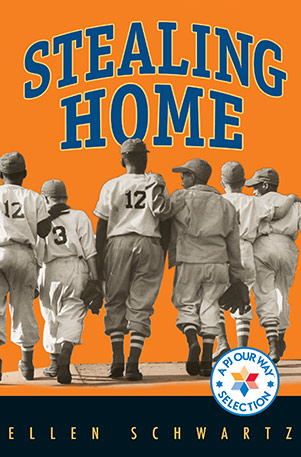Stealing Home
Baseball is a great escape, but can it solve your problems? Nine-year-old Joey Sexton has to grow up fast – his African American dad is gone, his Jewish mother just died, and now he has been sent to live with his mother’s family in Brooklyn. Joey’s zayde (grandfather) acts as though Joey can’t do anything right. Sure, Joey can play a mean game of baseball, but is that enough to impress the person whose affection he wants most?
Average Rating
( hint: Login to leave a review! )
38 Reviews
Leave Review
What the Book is About
Jewish Content & Values
Positive Role Models
Content Advisory
Talk it Over!
More for You
What the Book is About
Orphaned at age nine, Joey Sexton has already experienced a more fraught and complicated life than most adults. When Joey’s mother dies of an apparent drug overdose (which is not described in detail), he is sent from his home in the Bronx to live in Brooklyn with his mother’s Jewish family that he never knew existed. Life in post-war Brooklyn is already tough for a biracial kid, but now Joey must contend with his grandfather’s ambivalence about adopting him. To make matters worse, Joey is a die-hard Yankees fan and he has entered indisputable Dodgers territory! But with baseball as a backdrop, and Jackie Robinson as an inspiration, Joey manages to find his way into his grandfather’s heart as he discovers the true meaning of family, love, and loyalty.
Jewish Content & Values
- Shabbat: Joey's aunt and grandfather are traditional Jews who celebrate Shabbat (Hebrew for Sabbath; a time of rest beginning on Friday night and ending on Saturday night). Joey slowly begins to enjoy the warmth, comfort, and delicious food that are part of their weekly Shabbat observance.
- Shul (Yiddish for synagogue; a Jewish place of worship): Every Saturday, Zeyde (Joey's grandfather; Zeyde is Yiddish for grandfather) goes to shul for Shabbat services. Typical of 1940s Brooklyn, sons and grandsons join their fathers and grandfathers at shul. Joey longs for Zeyde to invite him to join, and when Zeyde does, Joey knows he has truly become his grandfather's grandson.
Positive Role Models
- Frieda Rosen, Joey's aunt, is determined for Joey to become a true member of her family. She learns to stand up to Zeyde, her father, and as the book progresses, her voice gets stronger and more confident. By the end of the book, she becomes a fierce advocate against prejudice and openly confronts Mrs. Yanofsky, the store owner who makes racist and insulting remarks against Joey and his family.
- Bobby (Joey's cousin) and her group of friends (Louise, Vito, and Grossie) show courage and bravery as they take on the local bullies who continously taunt Joey because he is biracial. By the end of the book, these friends chase the bullies away for good, proving their loyalty and love to Joey.
Content Advisory
- Derogatory words: Stealing Home is an emotional story that reflects the tumultuous period before the Civil Rights movement. In order to give readers an honest view of prejudice at that time, there are racist characters who use offensive terms such as the n-word and shvartze (a derogatory word meaning 'black' in Yiddish).
- Death of Joey's mother: At the beginning of the book, we are told that Joey's mother has died of a drug overdose. Joey remembers times when she was happy and other times when she was "messed up", and readers learn that he sometimes went neglected and hungry. The author does not go into great detail about her death and many kid readers many not pick up on this plot line at all.
Talk it Over!
This story captures many different angles of prejudice. In the Bronx, Joey is called "white bread" and "cracker" by African Americans who think he's white, while in Brooklyn, he faces anti-black prejudice. Bobby is considered unusual because she's a girl who loves baseball and hates anything "girlie." Her Zeyde never offers to bring her to shul because he believes that it is a place traditionally meant for boys. Do you think these types of prejudices still exist today? Have you ever witnessed prejudice? If you lived in the 1940s, how do you think you would have responded to prejudice?
More for You
Shiva: In Jewish tradition, the death of a close relative is mourned for seven days after the burial. Called shiva (hebrew for 'seven'), these seven days are an opportunity for friends and family to comfort the mourners and give them space to reflect on their loss and sadness. There are many customs associated with shiva, and practices differ among communities. Mourners show signs of sadness by covering mirrors and sitting low to the ground (which is why shiva is often referred to as "sitting shiva"). In Stealing Home, Zeyde is embarassed to admit that he "sat shiva" when his daughter Becky ran away with a non-Jewish man. This reflects an old European tradition (when intermarriage was rare) and usually meant a complete separation from family and community. Today, it is unusual for even very observant families to react to intermarriage in such an extreme way.
What the Book is About
What the Book is About
Orphaned at age nine, Joey Sexton has already experienced a more fraught and complicated life than most adults. When Joey’s mother dies of an apparent drug overdose (which is not described in detail), he is sent from his home in the Bronx to live in Brooklyn with his mother’s Jewish family that he never knew existed. Life in post-war Brooklyn is already tough for a biracial kid, but now Joey must contend with his grandfather’s ambivalence about adopting him. To make matters worse, Joey is a die-hard Yankees fan and he has entered indisputable Dodgers territory! But with baseball as a backdrop, and Jackie Robinson as an inspiration, Joey manages to find his way into his grandfather’s heart as he discovers the true meaning of family, love, and loyalty.
Jewish Content & Values
Jewish Content & Values
- Shabbat: Joey's aunt and grandfather are traditional Jews who celebrate Shabbat (Hebrew for Sabbath; a time of rest beginning on Friday night and ending on Saturday night). Joey slowly begins to enjoy the warmth, comfort, and delicious food that are part of their weekly Shabbat observance.
- Shul (Yiddish for synagogue; a Jewish place of worship): Every Saturday, Zeyde (Joey's grandfather; Zeyde is Yiddish for grandfather) goes to shul for Shabbat services. Typical of 1940s Brooklyn, sons and grandsons join their fathers and grandfathers at shul. Joey longs for Zeyde to invite him to join, and when Zeyde does, Joey knows he has truly become his grandfather's grandson.
Positive Role Models
Positive Role Models
- Frieda Rosen, Joey's aunt, is determined for Joey to become a true member of her family. She learns to stand up to Zeyde, her father, and as the book progresses, her voice gets stronger and more confident. By the end of the book, she becomes a fierce advocate against prejudice and openly confronts Mrs. Yanofsky, the store owner who makes racist and insulting remarks against Joey and his family.
- Bobby (Joey's cousin) and her group of friends (Louise, Vito, and Grossie) show courage and bravery as they take on the local bullies who continously taunt Joey because he is biracial. By the end of the book, these friends chase the bullies away for good, proving their loyalty and love to Joey.
Content Advisory
Content Advisory
- Derogatory words: Stealing Home is an emotional story that reflects the tumultuous period before the Civil Rights movement. In order to give readers an honest view of prejudice at that time, there are racist characters who use offensive terms such as the n-word and shvartze (a derogatory word meaning 'black' in Yiddish).
- Death of Joey's mother: At the beginning of the book, we are told that Joey's mother has died of a drug overdose. Joey remembers times when she was happy and other times when she was "messed up", and readers learn that he sometimes went neglected and hungry. The author does not go into great detail about her death and many kid readers many not pick up on this plot line at all.
Talk it Over!
Talk it Over!
This story captures many different angles of prejudice. In the Bronx, Joey is called "white bread" and "cracker" by African Americans who think he's white, while in Brooklyn, he faces anti-black prejudice. Bobby is considered unusual because she's a girl who loves baseball and hates anything "girlie." Her Zeyde never offers to bring her to shul because he believes that it is a place traditionally meant for boys. Do you think these types of prejudices still exist today? Have you ever witnessed prejudice? If you lived in the 1940s, how do you think you would have responded to prejudice?
More for You
More for You
Shiva: In Jewish tradition, the death of a close relative is mourned for seven days after the burial. Called shiva (hebrew for 'seven'), these seven days are an opportunity for friends and family to comfort the mourners and give them space to reflect on their loss and sadness. There are many customs associated with shiva, and practices differ among communities. Mourners show signs of sadness by covering mirrors and sitting low to the ground (which is why shiva is often referred to as "sitting shiva"). In Stealing Home, Zeyde is embarassed to admit that he "sat shiva" when his daughter Becky ran away with a non-Jewish man. This reflects an old European tradition (when intermarriage was rare) and usually meant a complete separation from family and community. Today, it is unusual for even very observant families to react to intermarriage in such an extreme way.



